Tesco: Developing Individual, Teams, & Organisations Development
VerifiedAdded on 2024/06/11
|25
|4899
|88
Report
AI Summary
This report analyzes the development of individuals, teams, and organizations, focusing on Tesco PLC. It determines the knowledge, skills, and behaviors required by HR professionals and analyzes a personal skills audit to create a professional development plan. The report differentiates between organizational and individual learning, training, and development, highlighting the need for continuous learning to drive business performance. It applies learning cycle theories, discusses high-performance working (HPW) and its contribution to employee engagement and competitive advantage, and evaluates different approaches to performance management, emphasizing their role in supporting a high-performance culture and commitment. The report concludes by synthesizing knowledge on how HPW and related mechanisms improve employee engagement, commitment, and competitive advantage.
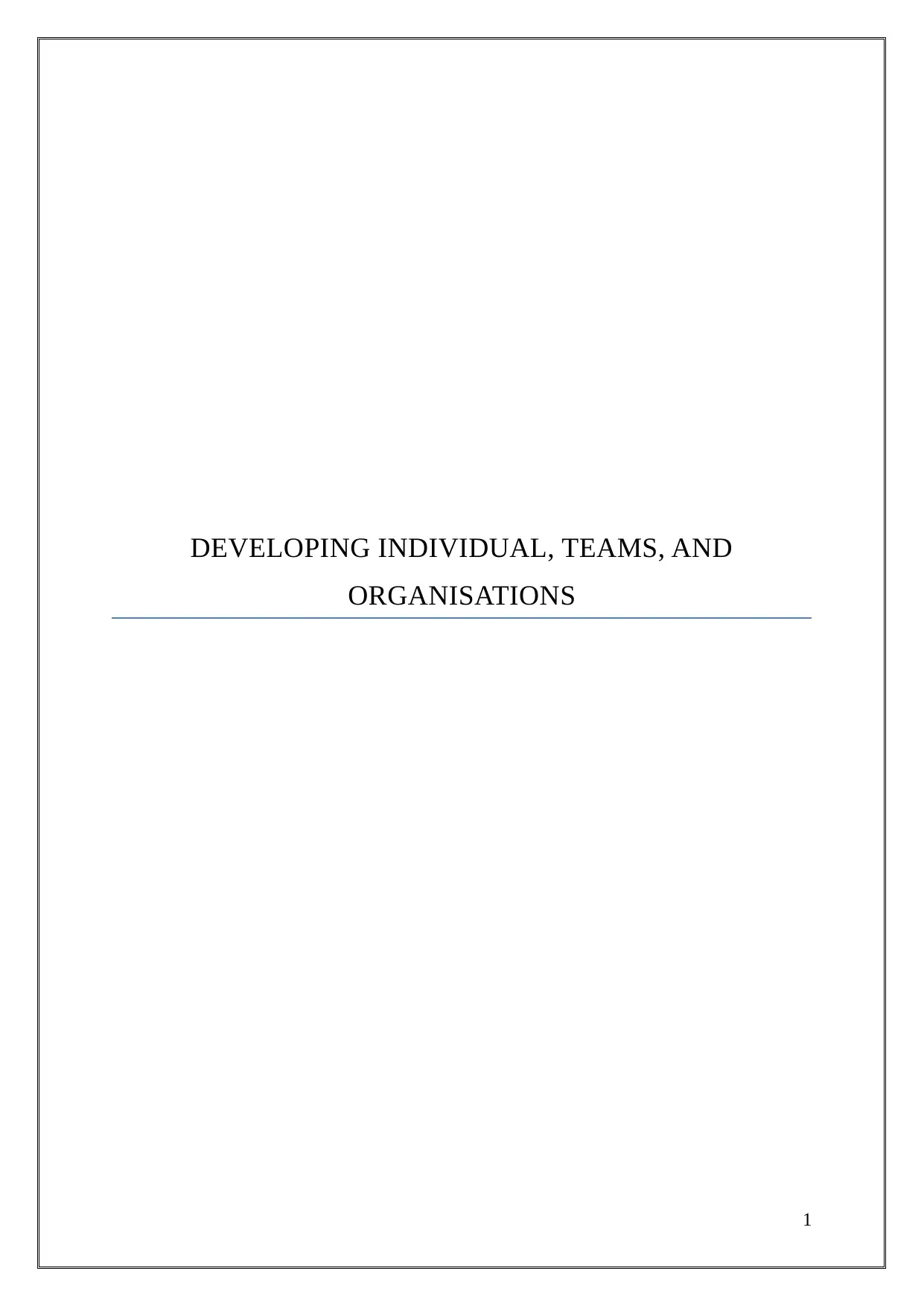
DEVELOPING INDIVIDUAL, TEAMS, AND
ORGANISATIONS
1
ORGANISATIONS
1
Paraphrase This Document
Need a fresh take? Get an instant paraphrase of this document with our AI Paraphraser
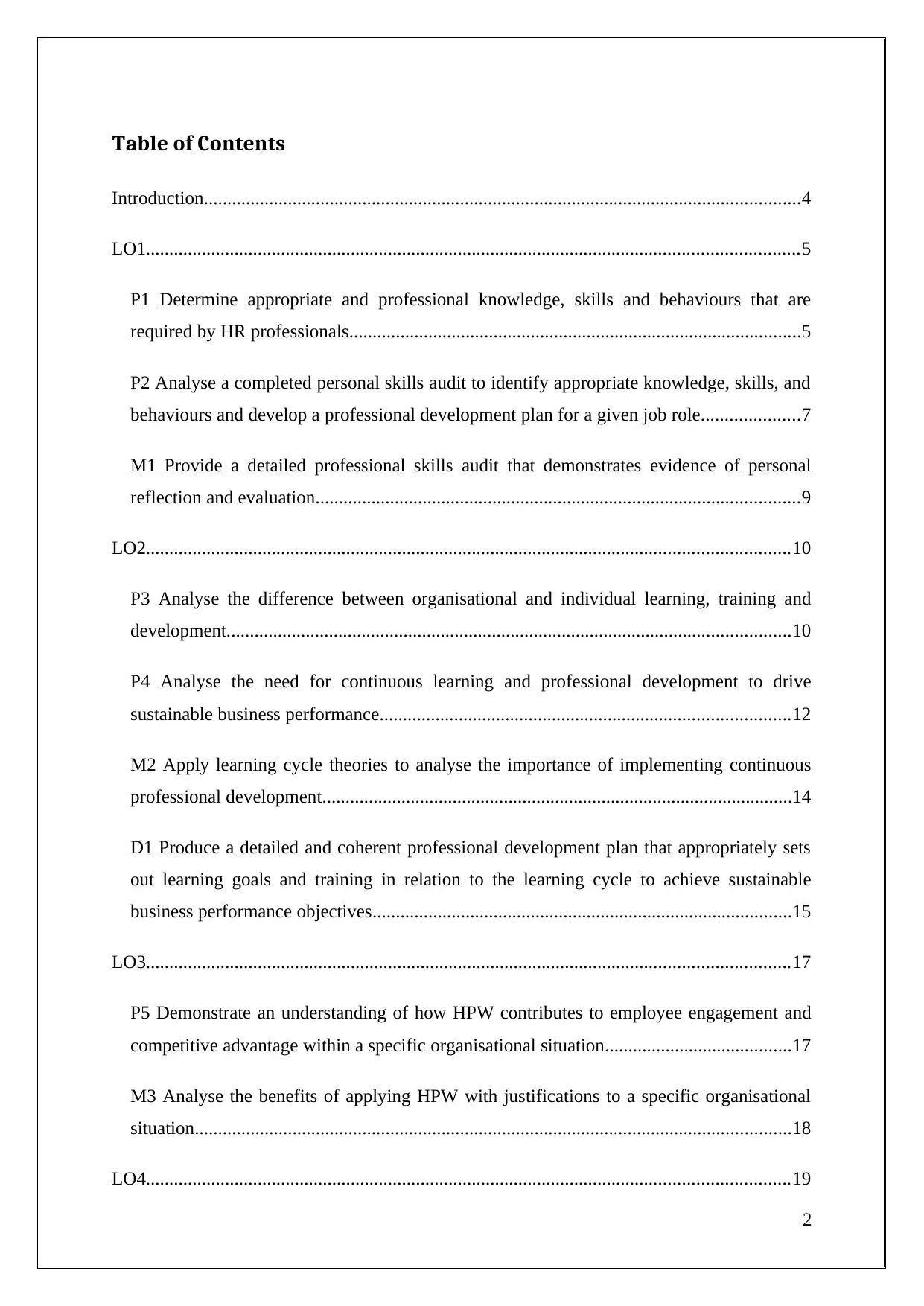
Table of Contents
Introduction................................................................................................................................4
LO1............................................................................................................................................5
P1 Determine appropriate and professional knowledge, skills and behaviours that are
required by HR professionals.................................................................................................5
P2 Analyse a completed personal skills audit to identify appropriate knowledge, skills, and
behaviours and develop a professional development plan for a given job role.....................7
M1 Provide a detailed professional skills audit that demonstrates evidence of personal
reflection and evaluation........................................................................................................9
LO2..........................................................................................................................................10
P3 Analyse the difference between organisational and individual learning, training and
development.........................................................................................................................10
P4 Analyse the need for continuous learning and professional development to drive
sustainable business performance........................................................................................12
M2 Apply learning cycle theories to analyse the importance of implementing continuous
professional development.....................................................................................................14
D1 Produce a detailed and coherent professional development plan that appropriately sets
out learning goals and training in relation to the learning cycle to achieve sustainable
business performance objectives..........................................................................................15
LO3..........................................................................................................................................17
P5 Demonstrate an understanding of how HPW contributes to employee engagement and
competitive advantage within a specific organisational situation........................................17
M3 Analyse the benefits of applying HPW with justifications to a specific organisational
situation................................................................................................................................18
LO4..........................................................................................................................................19
2
Introduction................................................................................................................................4
LO1............................................................................................................................................5
P1 Determine appropriate and professional knowledge, skills and behaviours that are
required by HR professionals.................................................................................................5
P2 Analyse a completed personal skills audit to identify appropriate knowledge, skills, and
behaviours and develop a professional development plan for a given job role.....................7
M1 Provide a detailed professional skills audit that demonstrates evidence of personal
reflection and evaluation........................................................................................................9
LO2..........................................................................................................................................10
P3 Analyse the difference between organisational and individual learning, training and
development.........................................................................................................................10
P4 Analyse the need for continuous learning and professional development to drive
sustainable business performance........................................................................................12
M2 Apply learning cycle theories to analyse the importance of implementing continuous
professional development.....................................................................................................14
D1 Produce a detailed and coherent professional development plan that appropriately sets
out learning goals and training in relation to the learning cycle to achieve sustainable
business performance objectives..........................................................................................15
LO3..........................................................................................................................................17
P5 Demonstrate an understanding of how HPW contributes to employee engagement and
competitive advantage within a specific organisational situation........................................17
M3 Analyse the benefits of applying HPW with justifications to a specific organisational
situation................................................................................................................................18
LO4..........................................................................................................................................19
2
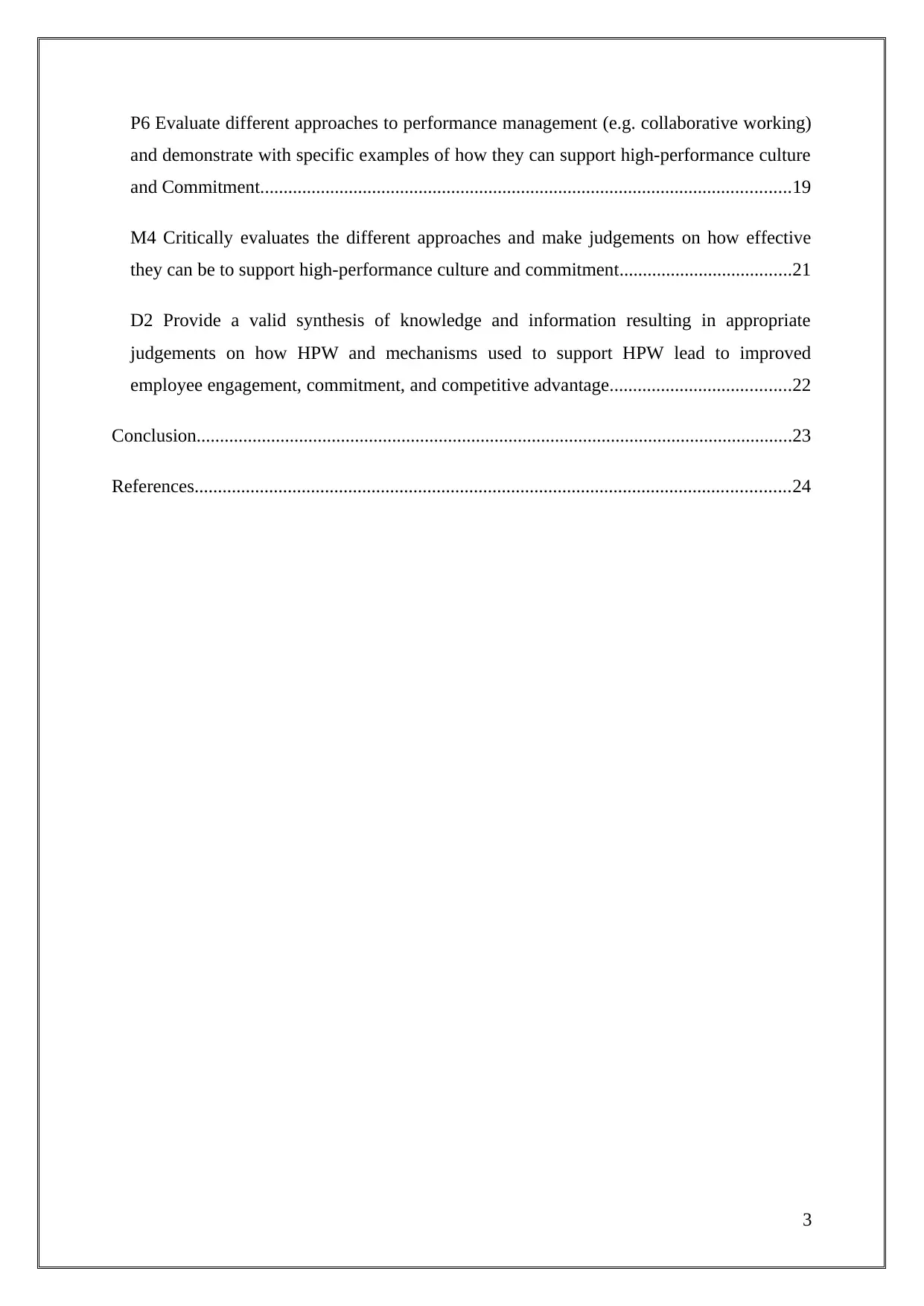
P6 Evaluate different approaches to performance management (e.g. collaborative working)
and demonstrate with specific examples of how they can support high-performance culture
and Commitment..................................................................................................................19
M4 Critically evaluates the different approaches and make judgements on how effective
they can be to support high-performance culture and commitment.....................................21
D2 Provide a valid synthesis of knowledge and information resulting in appropriate
judgements on how HPW and mechanisms used to support HPW lead to improved
employee engagement, commitment, and competitive advantage.......................................22
Conclusion................................................................................................................................23
References................................................................................................................................24
3
and demonstrate with specific examples of how they can support high-performance culture
and Commitment..................................................................................................................19
M4 Critically evaluates the different approaches and make judgements on how effective
they can be to support high-performance culture and commitment.....................................21
D2 Provide a valid synthesis of knowledge and information resulting in appropriate
judgements on how HPW and mechanisms used to support HPW lead to improved
employee engagement, commitment, and competitive advantage.......................................22
Conclusion................................................................................................................................23
References................................................................................................................................24
3
⊘ This is a preview!⊘
Do you want full access?
Subscribe today to unlock all pages.

Trusted by 1+ million students worldwide
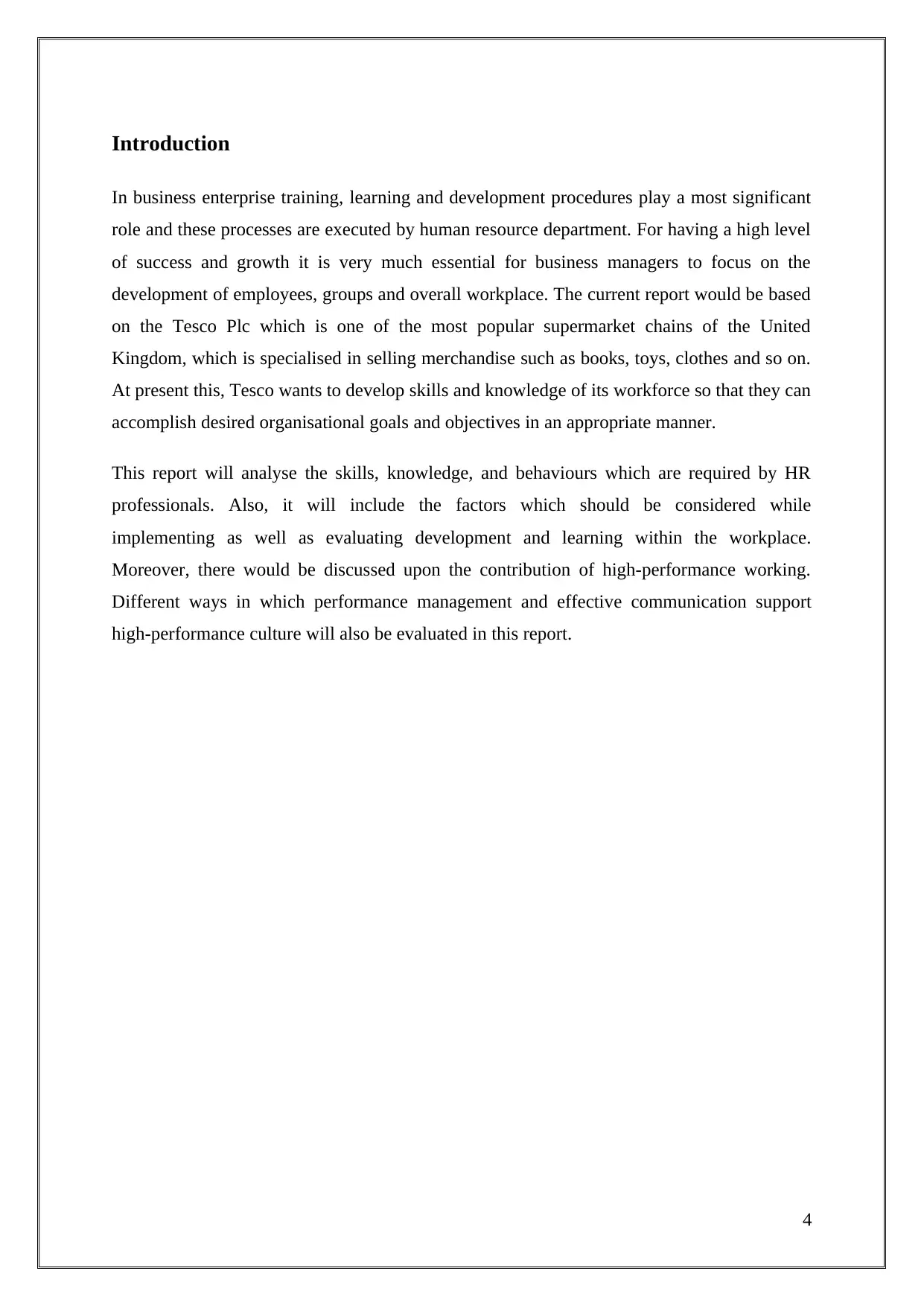
Introduction
In business enterprise training, learning and development procedures play a most significant
role and these processes are executed by human resource department. For having a high level
of success and growth it is very much essential for business managers to focus on the
development of employees, groups and overall workplace. The current report would be based
on the Tesco Plc which is one of the most popular supermarket chains of the United
Kingdom, which is specialised in selling merchandise such as books, toys, clothes and so on.
At present this, Tesco wants to develop skills and knowledge of its workforce so that they can
accomplish desired organisational goals and objectives in an appropriate manner.
This report will analyse the skills, knowledge, and behaviours which are required by HR
professionals. Also, it will include the factors which should be considered while
implementing as well as evaluating development and learning within the workplace.
Moreover, there would be discussed upon the contribution of high-performance working.
Different ways in which performance management and effective communication support
high-performance culture will also be evaluated in this report.
4
In business enterprise training, learning and development procedures play a most significant
role and these processes are executed by human resource department. For having a high level
of success and growth it is very much essential for business managers to focus on the
development of employees, groups and overall workplace. The current report would be based
on the Tesco Plc which is one of the most popular supermarket chains of the United
Kingdom, which is specialised in selling merchandise such as books, toys, clothes and so on.
At present this, Tesco wants to develop skills and knowledge of its workforce so that they can
accomplish desired organisational goals and objectives in an appropriate manner.
This report will analyse the skills, knowledge, and behaviours which are required by HR
professionals. Also, it will include the factors which should be considered while
implementing as well as evaluating development and learning within the workplace.
Moreover, there would be discussed upon the contribution of high-performance working.
Different ways in which performance management and effective communication support
high-performance culture will also be evaluated in this report.
4
Paraphrase This Document
Need a fresh take? Get an instant paraphrase of this document with our AI Paraphraser
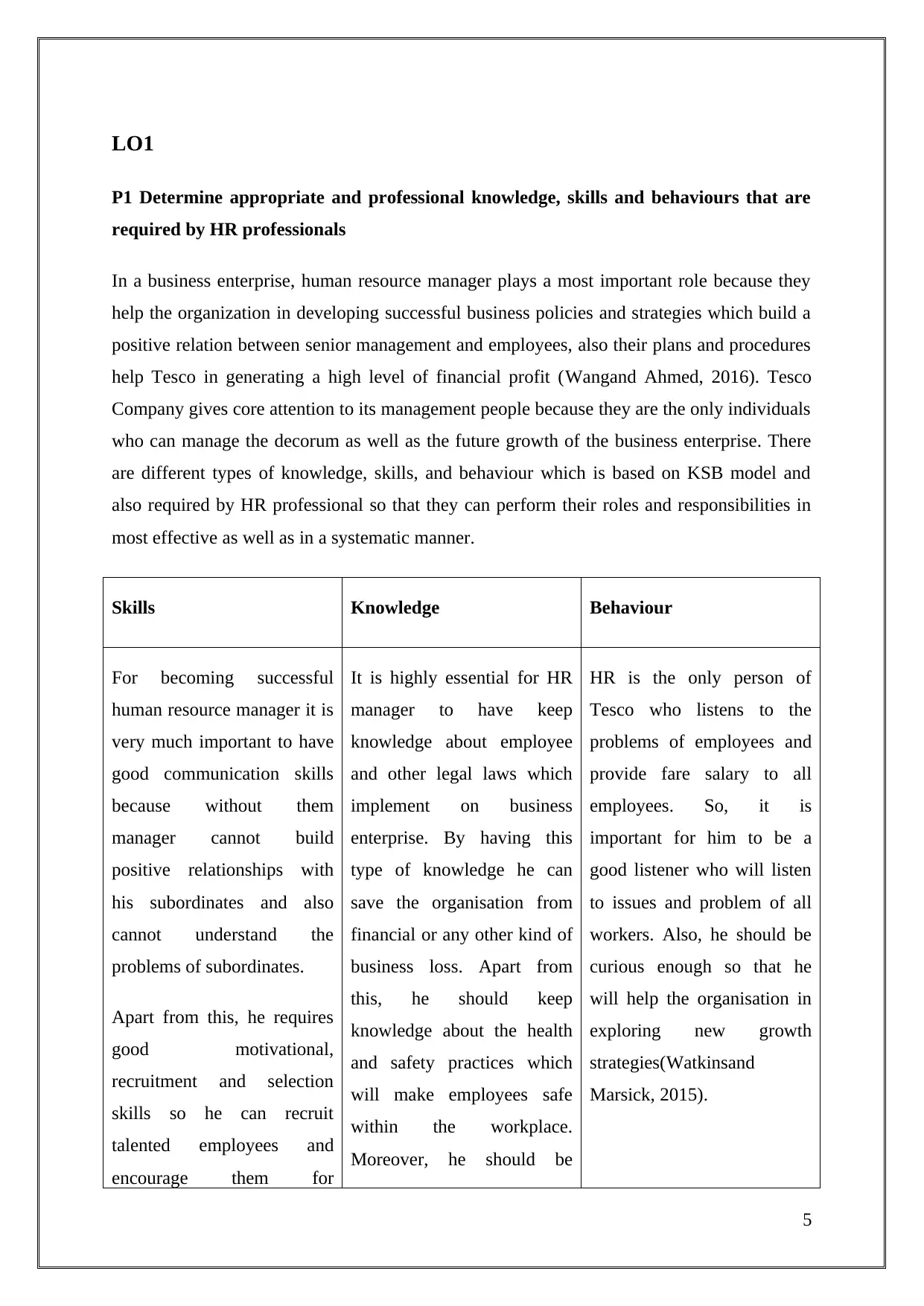
LO1
P1 Determine appropriate and professional knowledge, skills and behaviours that are
required by HR professionals
In a business enterprise, human resource manager plays a most important role because they
help the organization in developing successful business policies and strategies which build a
positive relation between senior management and employees, also their plans and procedures
help Tesco in generating a high level of financial profit (Wangand Ahmed, 2016). Tesco
Company gives core attention to its management people because they are the only individuals
who can manage the decorum as well as the future growth of the business enterprise. There
are different types of knowledge, skills, and behaviour which is based on KSB model and
also required by HR professional so that they can perform their roles and responsibilities in
most effective as well as in a systematic manner.
Skills Knowledge Behaviour
For becoming successful
human resource manager it is
very much important to have
good communication skills
because without them
manager cannot build
positive relationships with
his subordinates and also
cannot understand the
problems of subordinates.
Apart from this, he requires
good motivational,
recruitment and selection
skills so he can recruit
talented employees and
encourage them for
It is highly essential for HR
manager to have keep
knowledge about employee
and other legal laws which
implement on business
enterprise. By having this
type of knowledge he can
save the organisation from
financial or any other kind of
business loss. Apart from
this, he should keep
knowledge about the health
and safety practices which
will make employees safe
within the workplace.
Moreover, he should be
HR is the only person of
Tesco who listens to the
problems of employees and
provide fare salary to all
employees. So, it is
important for him to be a
good listener who will listen
to issues and problem of all
workers. Also, he should be
curious enough so that he
will help the organisation in
exploring new growth
strategies(Watkinsand
Marsick, 2015).
5
P1 Determine appropriate and professional knowledge, skills and behaviours that are
required by HR professionals
In a business enterprise, human resource manager plays a most important role because they
help the organization in developing successful business policies and strategies which build a
positive relation between senior management and employees, also their plans and procedures
help Tesco in generating a high level of financial profit (Wangand Ahmed, 2016). Tesco
Company gives core attention to its management people because they are the only individuals
who can manage the decorum as well as the future growth of the business enterprise. There
are different types of knowledge, skills, and behaviour which is based on KSB model and
also required by HR professional so that they can perform their roles and responsibilities in
most effective as well as in a systematic manner.
Skills Knowledge Behaviour
For becoming successful
human resource manager it is
very much important to have
good communication skills
because without them
manager cannot build
positive relationships with
his subordinates and also
cannot understand the
problems of subordinates.
Apart from this, he requires
good motivational,
recruitment and selection
skills so he can recruit
talented employees and
encourage them for
It is highly essential for HR
manager to have keep
knowledge about employee
and other legal laws which
implement on business
enterprise. By having this
type of knowledge he can
save the organisation from
financial or any other kind of
business loss. Apart from
this, he should keep
knowledge about the health
and safety practices which
will make employees safe
within the workplace.
Moreover, he should be
HR is the only person of
Tesco who listens to the
problems of employees and
provide fare salary to all
employees. So, it is
important for him to be a
good listener who will listen
to issues and problem of all
workers. Also, he should be
curious enough so that he
will help the organisation in
exploring new growth
strategies(Watkinsand
Marsick, 2015).
5
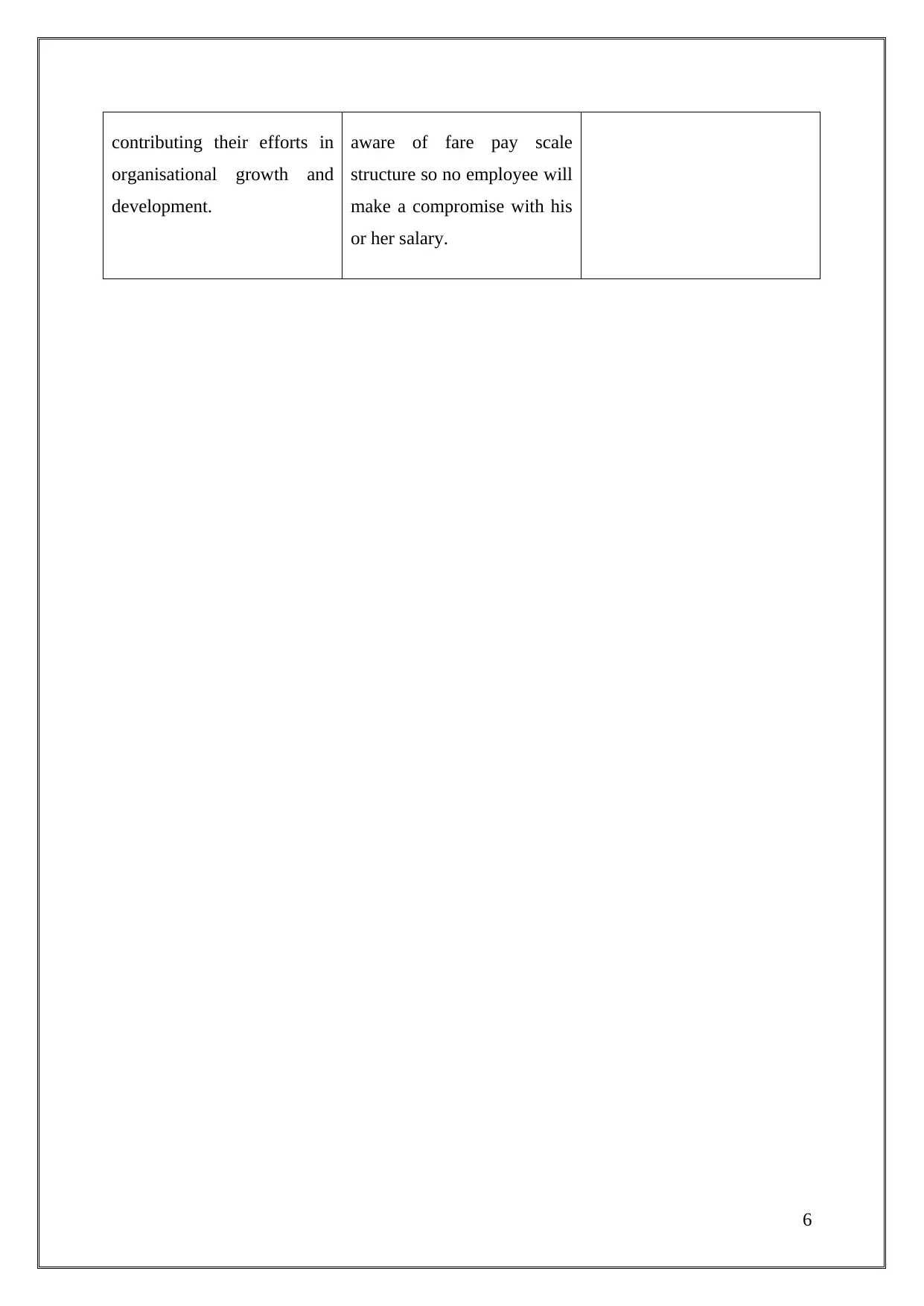
contributing their efforts in
organisational growth and
development.
aware of fare pay scale
structure so no employee will
make a compromise with his
or her salary.
6
organisational growth and
development.
aware of fare pay scale
structure so no employee will
make a compromise with his
or her salary.
6
⊘ This is a preview!⊘
Do you want full access?
Subscribe today to unlock all pages.

Trusted by 1+ million students worldwide
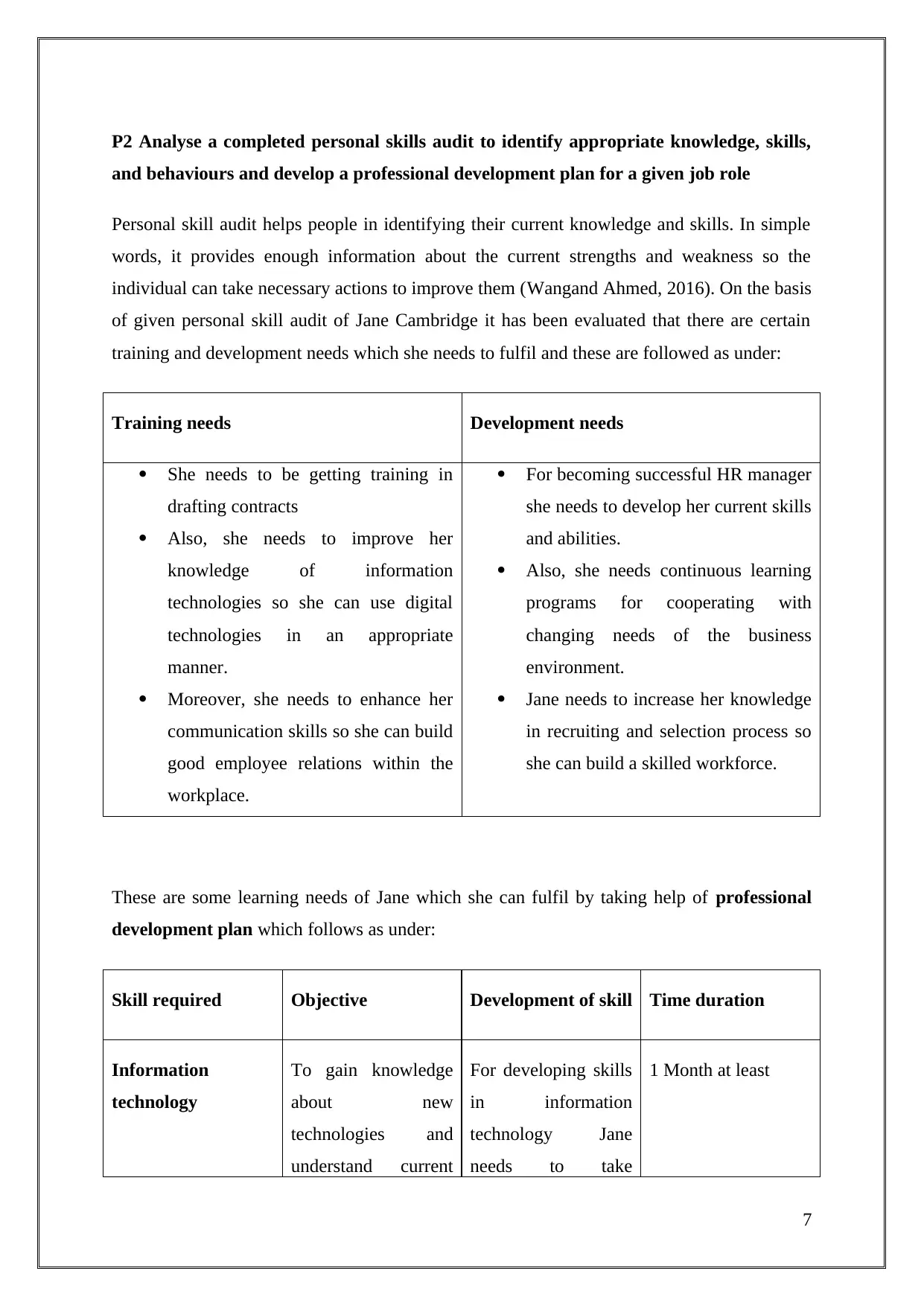
P2 Analyse a completed personal skills audit to identify appropriate knowledge, skills,
and behaviours and develop a professional development plan for a given job role
Personal skill audit helps people in identifying their current knowledge and skills. In simple
words, it provides enough information about the current strengths and weakness so the
individual can take necessary actions to improve them (Wangand Ahmed, 2016). On the basis
of given personal skill audit of Jane Cambridge it has been evaluated that there are certain
training and development needs which she needs to fulfil and these are followed as under:
Training needs Development needs
She needs to be getting training in
drafting contracts
Also, she needs to improve her
knowledge of information
technologies so she can use digital
technologies in an appropriate
manner.
Moreover, she needs to enhance her
communication skills so she can build
good employee relations within the
workplace.
For becoming successful HR manager
she needs to develop her current skills
and abilities.
Also, she needs continuous learning
programs for cooperating with
changing needs of the business
environment.
Jane needs to increase her knowledge
in recruiting and selection process so
she can build a skilled workforce.
These are some learning needs of Jane which she can fulfil by taking help of professional
development plan which follows as under:
Skill required Objective Development of skill Time duration
Information
technology
To gain knowledge
about new
technologies and
understand current
For developing skills
in information
technology Jane
needs to take
1 Month at least
7
and behaviours and develop a professional development plan for a given job role
Personal skill audit helps people in identifying their current knowledge and skills. In simple
words, it provides enough information about the current strengths and weakness so the
individual can take necessary actions to improve them (Wangand Ahmed, 2016). On the basis
of given personal skill audit of Jane Cambridge it has been evaluated that there are certain
training and development needs which she needs to fulfil and these are followed as under:
Training needs Development needs
She needs to be getting training in
drafting contracts
Also, she needs to improve her
knowledge of information
technologies so she can use digital
technologies in an appropriate
manner.
Moreover, she needs to enhance her
communication skills so she can build
good employee relations within the
workplace.
For becoming successful HR manager
she needs to develop her current skills
and abilities.
Also, she needs continuous learning
programs for cooperating with
changing needs of the business
environment.
Jane needs to increase her knowledge
in recruiting and selection process so
she can build a skilled workforce.
These are some learning needs of Jane which she can fulfil by taking help of professional
development plan which follows as under:
Skill required Objective Development of skill Time duration
Information
technology
To gain knowledge
about new
technologies and
understand current
For developing skills
in information
technology Jane
needs to take
1 Month at least
7
Paraphrase This Document
Need a fresh take? Get an instant paraphrase of this document with our AI Paraphraser
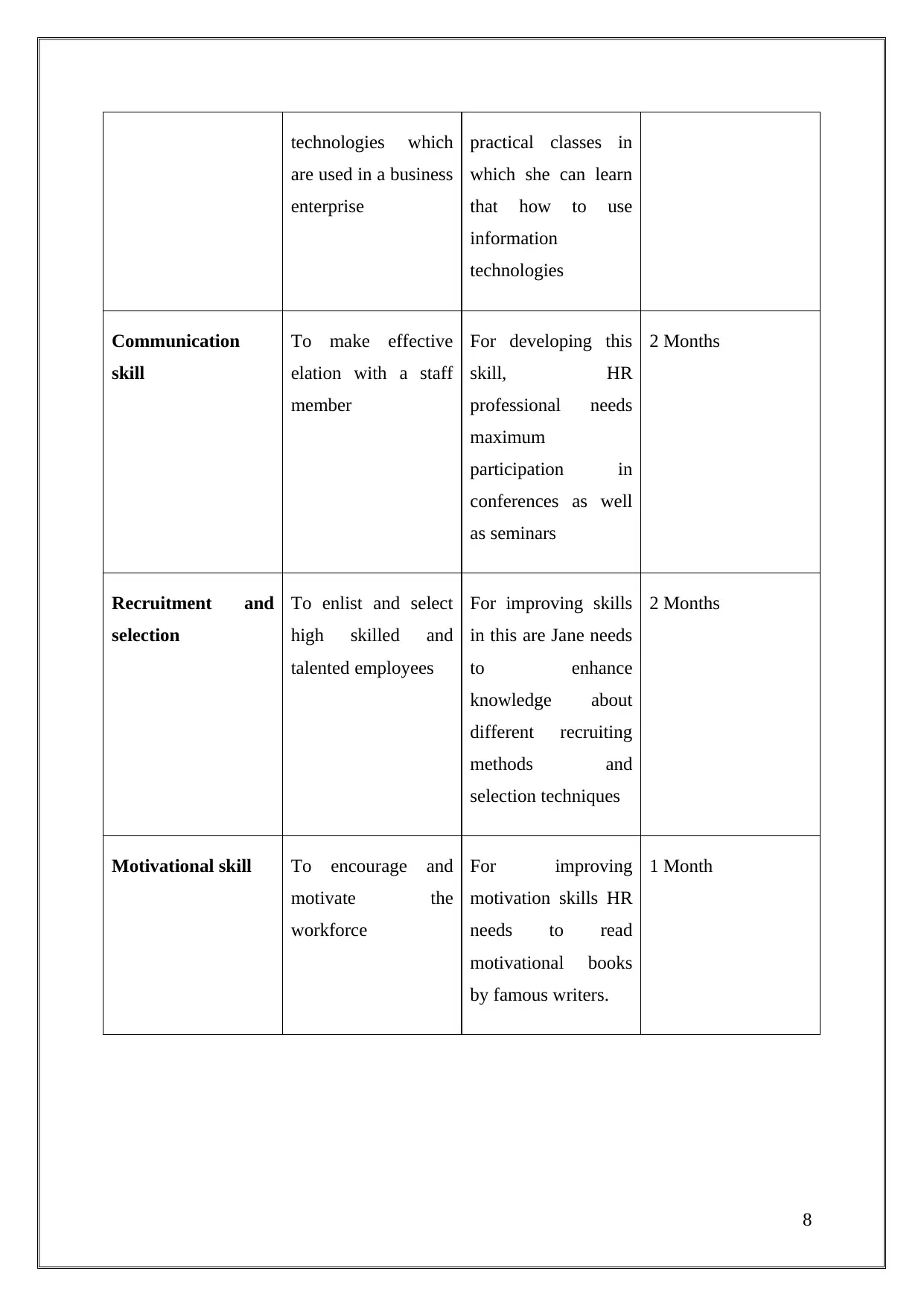
technologies which
are used in a business
enterprise
practical classes in
which she can learn
that how to use
information
technologies
Communication
skill
To make effective
elation with a staff
member
For developing this
skill, HR
professional needs
maximum
participation in
conferences as well
as seminars
2 Months
Recruitment and
selection
To enlist and select
high skilled and
talented employees
For improving skills
in this are Jane needs
to enhance
knowledge about
different recruiting
methods and
selection techniques
2 Months
Motivational skill To encourage and
motivate the
workforce
For improving
motivation skills HR
needs to read
motivational books
by famous writers.
1 Month
8
are used in a business
enterprise
practical classes in
which she can learn
that how to use
information
technologies
Communication
skill
To make effective
elation with a staff
member
For developing this
skill, HR
professional needs
maximum
participation in
conferences as well
as seminars
2 Months
Recruitment and
selection
To enlist and select
high skilled and
talented employees
For improving skills
in this are Jane needs
to enhance
knowledge about
different recruiting
methods and
selection techniques
2 Months
Motivational skill To encourage and
motivate the
workforce
For improving
motivation skills HR
needs to read
motivational books
by famous writers.
1 Month
8
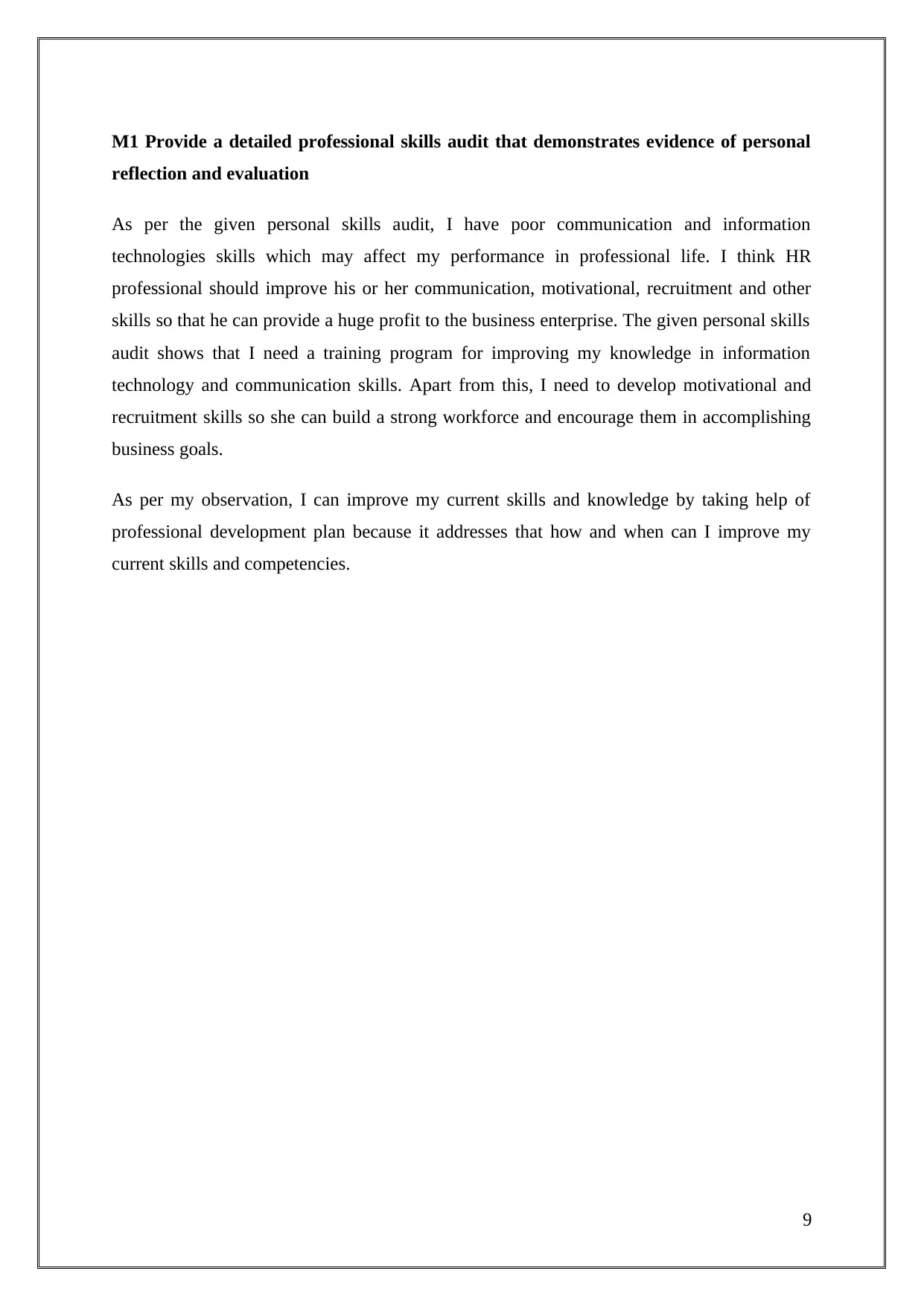
M1 Provide a detailed professional skills audit that demonstrates evidence of personal
reflection and evaluation
As per the given personal skills audit, I have poor communication and information
technologies skills which may affect my performance in professional life. I think HR
professional should improve his or her communication, motivational, recruitment and other
skills so that he can provide a huge profit to the business enterprise. The given personal skills
audit shows that I need a training program for improving my knowledge in information
technology and communication skills. Apart from this, I need to develop motivational and
recruitment skills so she can build a strong workforce and encourage them in accomplishing
business goals.
As per my observation, I can improve my current skills and knowledge by taking help of
professional development plan because it addresses that how and when can I improve my
current skills and competencies.
9
reflection and evaluation
As per the given personal skills audit, I have poor communication and information
technologies skills which may affect my performance in professional life. I think HR
professional should improve his or her communication, motivational, recruitment and other
skills so that he can provide a huge profit to the business enterprise. The given personal skills
audit shows that I need a training program for improving my knowledge in information
technology and communication skills. Apart from this, I need to develop motivational and
recruitment skills so she can build a strong workforce and encourage them in accomplishing
business goals.
As per my observation, I can improve my current skills and knowledge by taking help of
professional development plan because it addresses that how and when can I improve my
current skills and competencies.
9
⊘ This is a preview!⊘
Do you want full access?
Subscribe today to unlock all pages.

Trusted by 1+ million students worldwide
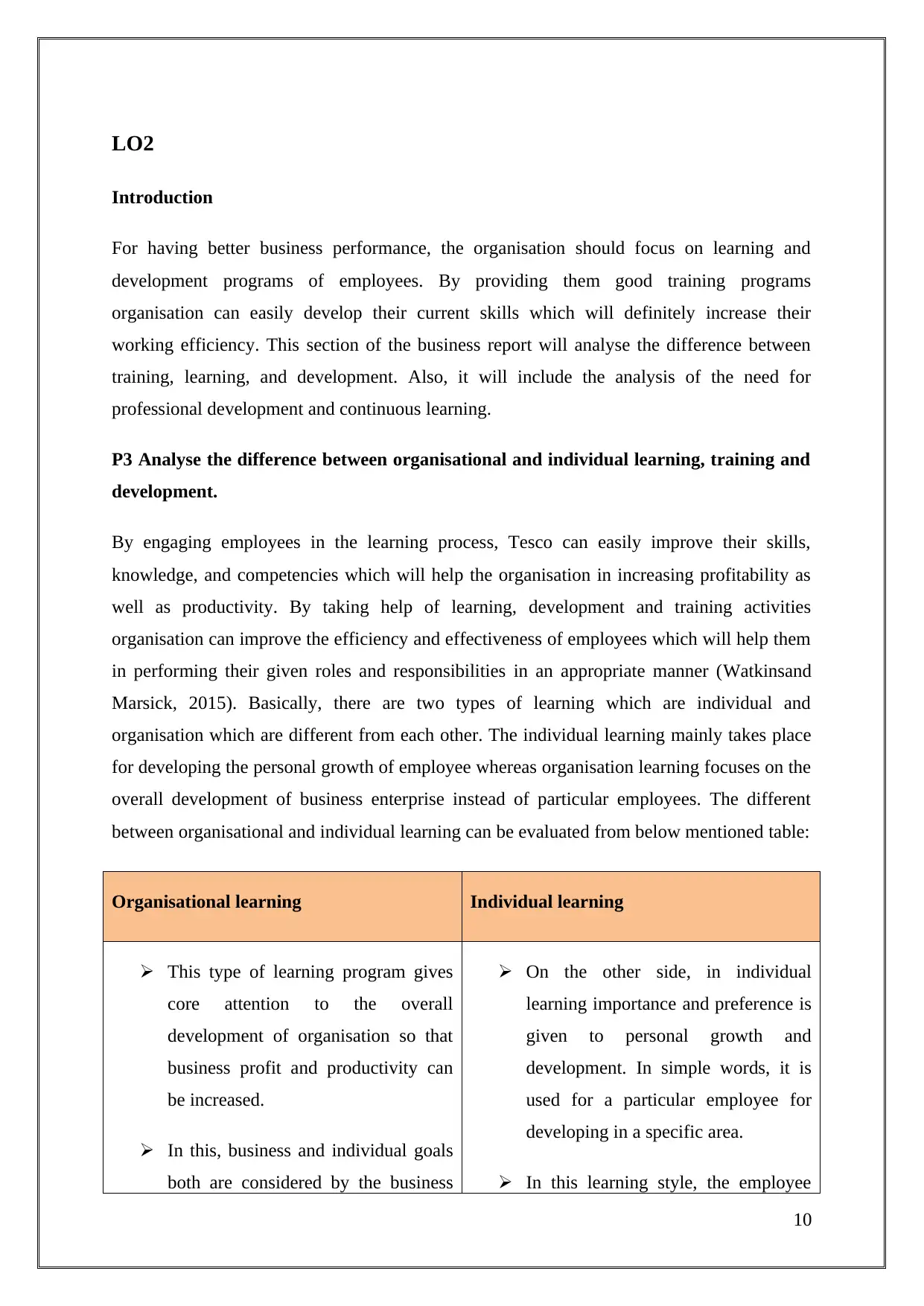
LO2
Introduction
For having better business performance, the organisation should focus on learning and
development programs of employees. By providing them good training programs
organisation can easily develop their current skills which will definitely increase their
working efficiency. This section of the business report will analyse the difference between
training, learning, and development. Also, it will include the analysis of the need for
professional development and continuous learning.
P3 Analyse the difference between organisational and individual learning, training and
development.
By engaging employees in the learning process, Tesco can easily improve their skills,
knowledge, and competencies which will help the organisation in increasing profitability as
well as productivity. By taking help of learning, development and training activities
organisation can improve the efficiency and effectiveness of employees which will help them
in performing their given roles and responsibilities in an appropriate manner (Watkinsand
Marsick, 2015). Basically, there are two types of learning which are individual and
organisation which are different from each other. The individual learning mainly takes place
for developing the personal growth of employee whereas organisation learning focuses on the
overall development of business enterprise instead of particular employees. The different
between organisational and individual learning can be evaluated from below mentioned table:
Organisational learning Individual learning
This type of learning program gives
core attention to the overall
development of organisation so that
business profit and productivity can
be increased.
In this, business and individual goals
both are considered by the business
On the other side, in individual
learning importance and preference is
given to personal growth and
development. In simple words, it is
used for a particular employee for
developing in a specific area.
In this learning style, the employee
10
Introduction
For having better business performance, the organisation should focus on learning and
development programs of employees. By providing them good training programs
organisation can easily develop their current skills which will definitely increase their
working efficiency. This section of the business report will analyse the difference between
training, learning, and development. Also, it will include the analysis of the need for
professional development and continuous learning.
P3 Analyse the difference between organisational and individual learning, training and
development.
By engaging employees in the learning process, Tesco can easily improve their skills,
knowledge, and competencies which will help the organisation in increasing profitability as
well as productivity. By taking help of learning, development and training activities
organisation can improve the efficiency and effectiveness of employees which will help them
in performing their given roles and responsibilities in an appropriate manner (Watkinsand
Marsick, 2015). Basically, there are two types of learning which are individual and
organisation which are different from each other. The individual learning mainly takes place
for developing the personal growth of employee whereas organisation learning focuses on the
overall development of business enterprise instead of particular employees. The different
between organisational and individual learning can be evaluated from below mentioned table:
Organisational learning Individual learning
This type of learning program gives
core attention to the overall
development of organisation so that
business profit and productivity can
be increased.
In this, business and individual goals
both are considered by the business
On the other side, in individual
learning importance and preference is
given to personal growth and
development. In simple words, it is
used for a particular employee for
developing in a specific area.
In this learning style, the employee
10
Paraphrase This Document
Need a fresh take? Get an instant paraphrase of this document with our AI Paraphraser
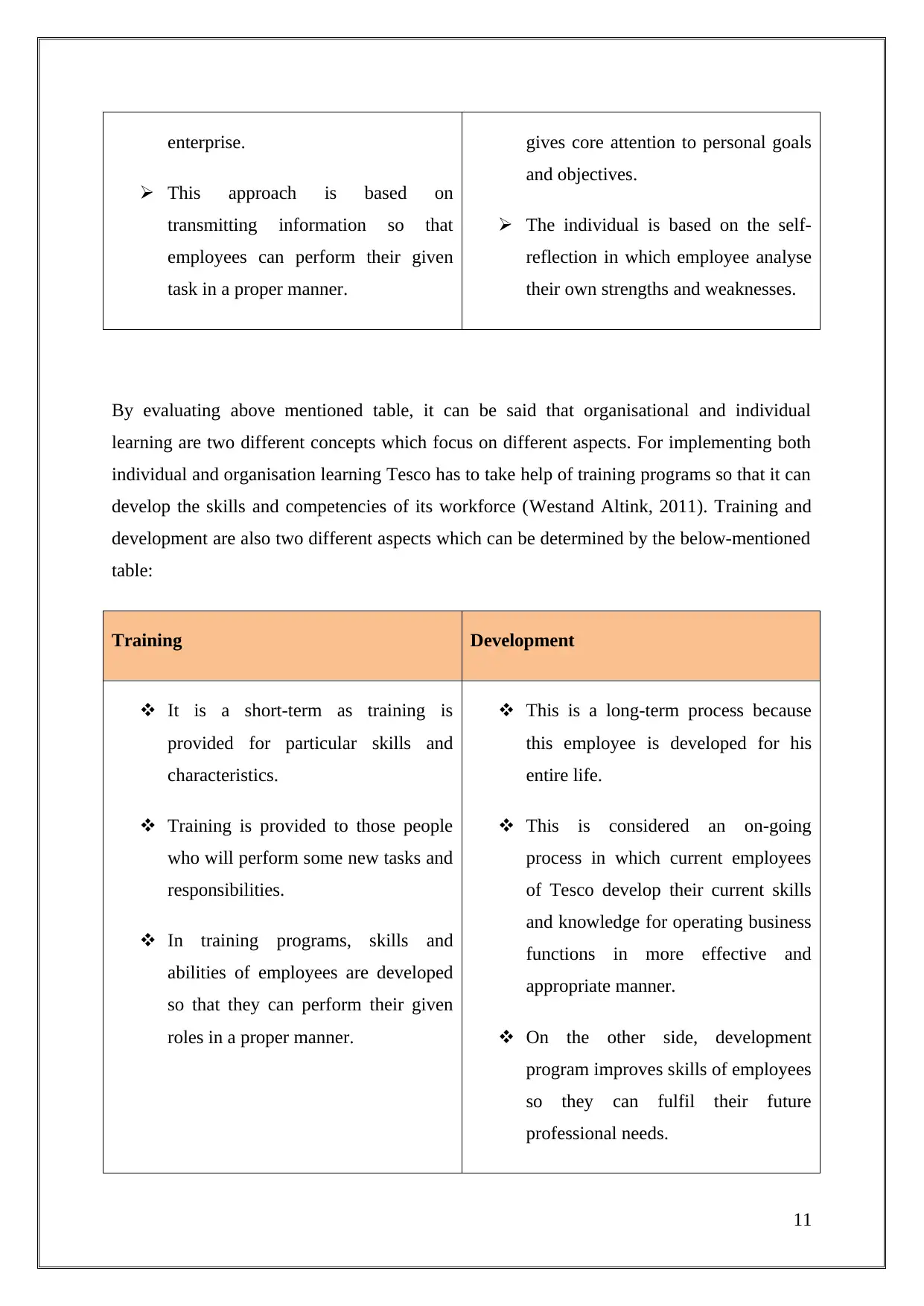
enterprise.
This approach is based on
transmitting information so that
employees can perform their given
task in a proper manner.
gives core attention to personal goals
and objectives.
The individual is based on the self-
reflection in which employee analyse
their own strengths and weaknesses.
By evaluating above mentioned table, it can be said that organisational and individual
learning are two different concepts which focus on different aspects. For implementing both
individual and organisation learning Tesco has to take help of training programs so that it can
develop the skills and competencies of its workforce (Westand Altink, 2011). Training and
development are also two different aspects which can be determined by the below-mentioned
table:
Training Development
It is a short-term as training is
provided for particular skills and
characteristics.
Training is provided to those people
who will perform some new tasks and
responsibilities.
In training programs, skills and
abilities of employees are developed
so that they can perform their given
roles in a proper manner.
This is a long-term process because
this employee is developed for his
entire life.
This is considered an on-going
process in which current employees
of Tesco develop their current skills
and knowledge for operating business
functions in more effective and
appropriate manner.
On the other side, development
program improves skills of employees
so they can fulfil their future
professional needs.
11
This approach is based on
transmitting information so that
employees can perform their given
task in a proper manner.
gives core attention to personal goals
and objectives.
The individual is based on the self-
reflection in which employee analyse
their own strengths and weaknesses.
By evaluating above mentioned table, it can be said that organisational and individual
learning are two different concepts which focus on different aspects. For implementing both
individual and organisation learning Tesco has to take help of training programs so that it can
develop the skills and competencies of its workforce (Westand Altink, 2011). Training and
development are also two different aspects which can be determined by the below-mentioned
table:
Training Development
It is a short-term as training is
provided for particular skills and
characteristics.
Training is provided to those people
who will perform some new tasks and
responsibilities.
In training programs, skills and
abilities of employees are developed
so that they can perform their given
roles in a proper manner.
This is a long-term process because
this employee is developed for his
entire life.
This is considered an on-going
process in which current employees
of Tesco develop their current skills
and knowledge for operating business
functions in more effective and
appropriate manner.
On the other side, development
program improves skills of employees
so they can fulfil their future
professional needs.
11
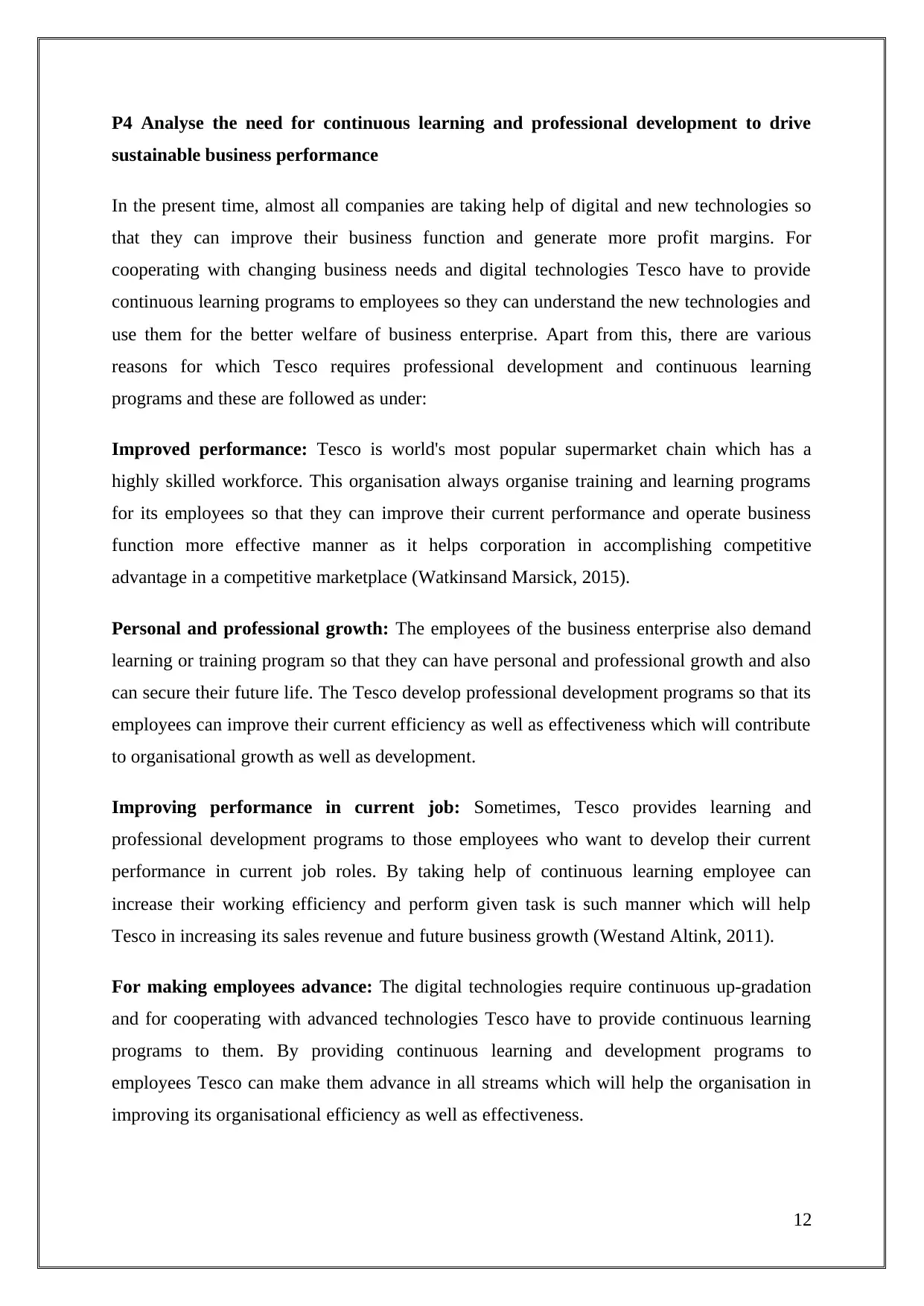
P4 Analyse the need for continuous learning and professional development to drive
sustainable business performance
In the present time, almost all companies are taking help of digital and new technologies so
that they can improve their business function and generate more profit margins. For
cooperating with changing business needs and digital technologies Tesco have to provide
continuous learning programs to employees so they can understand the new technologies and
use them for the better welfare of business enterprise. Apart from this, there are various
reasons for which Tesco requires professional development and continuous learning
programs and these are followed as under:
Improved performance: Tesco is world's most popular supermarket chain which has a
highly skilled workforce. This organisation always organise training and learning programs
for its employees so that they can improve their current performance and operate business
function more effective manner as it helps corporation in accomplishing competitive
advantage in a competitive marketplace (Watkinsand Marsick, 2015).
Personal and professional growth: The employees of the business enterprise also demand
learning or training program so that they can have personal and professional growth and also
can secure their future life. The Tesco develop professional development programs so that its
employees can improve their current efficiency as well as effectiveness which will contribute
to organisational growth as well as development.
Improving performance in current job: Sometimes, Tesco provides learning and
professional development programs to those employees who want to develop their current
performance in current job roles. By taking help of continuous learning employee can
increase their working efficiency and perform given task is such manner which will help
Tesco in increasing its sales revenue and future business growth (Westand Altink, 2011).
For making employees advance: The digital technologies require continuous up-gradation
and for cooperating with advanced technologies Tesco have to provide continuous learning
programs to them. By providing continuous learning and development programs to
employees Tesco can make them advance in all streams which will help the organisation in
improving its organisational efficiency as well as effectiveness.
12
sustainable business performance
In the present time, almost all companies are taking help of digital and new technologies so
that they can improve their business function and generate more profit margins. For
cooperating with changing business needs and digital technologies Tesco have to provide
continuous learning programs to employees so they can understand the new technologies and
use them for the better welfare of business enterprise. Apart from this, there are various
reasons for which Tesco requires professional development and continuous learning
programs and these are followed as under:
Improved performance: Tesco is world's most popular supermarket chain which has a
highly skilled workforce. This organisation always organise training and learning programs
for its employees so that they can improve their current performance and operate business
function more effective manner as it helps corporation in accomplishing competitive
advantage in a competitive marketplace (Watkinsand Marsick, 2015).
Personal and professional growth: The employees of the business enterprise also demand
learning or training program so that they can have personal and professional growth and also
can secure their future life. The Tesco develop professional development programs so that its
employees can improve their current efficiency as well as effectiveness which will contribute
to organisational growth as well as development.
Improving performance in current job: Sometimes, Tesco provides learning and
professional development programs to those employees who want to develop their current
performance in current job roles. By taking help of continuous learning employee can
increase their working efficiency and perform given task is such manner which will help
Tesco in increasing its sales revenue and future business growth (Westand Altink, 2011).
For making employees advance: The digital technologies require continuous up-gradation
and for cooperating with advanced technologies Tesco have to provide continuous learning
programs to them. By providing continuous learning and development programs to
employees Tesco can make them advance in all streams which will help the organisation in
improving its organisational efficiency as well as effectiveness.
12
⊘ This is a preview!⊘
Do you want full access?
Subscribe today to unlock all pages.

Trusted by 1+ million students worldwide
1 out of 25
Related Documents
Your All-in-One AI-Powered Toolkit for Academic Success.
+13062052269
info@desklib.com
Available 24*7 on WhatsApp / Email
![[object Object]](/_next/static/media/star-bottom.7253800d.svg)
Unlock your academic potential
Copyright © 2020–2026 A2Z Services. All Rights Reserved. Developed and managed by ZUCOL.


